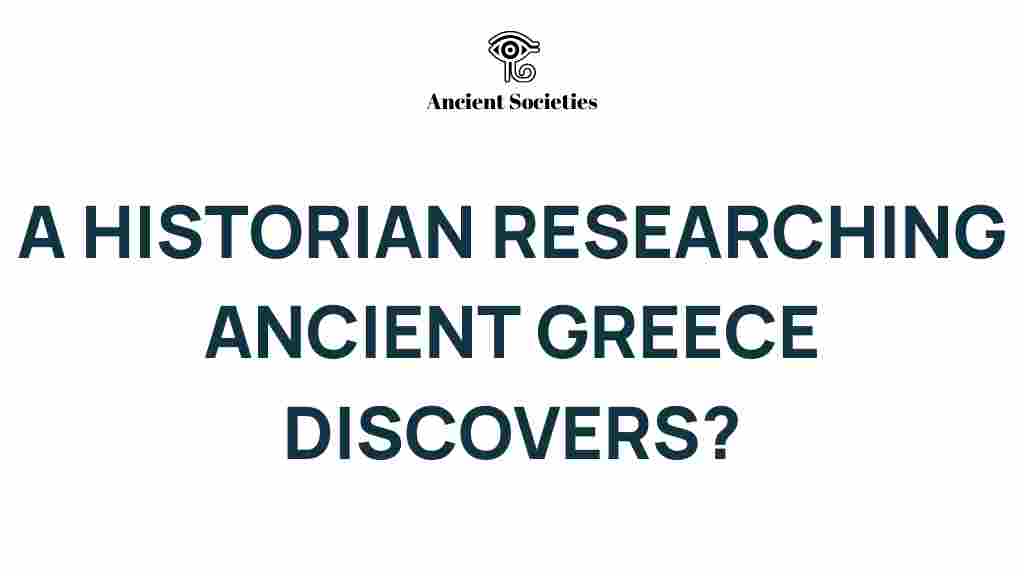What Secrets Did a Historian Uncover in Ancient Greece?
Ancient Greece is often celebrated as the cradle of Western civilization, a place where art, philosophy, and democracy flourished. However, much of what we know today is just the tip of the iceberg. Within the ruins of ancient temples, the remnants of pottery, and the inscriptions on stone, historians have uncovered secrets that reveal the complexities of this remarkable civilization. In this article, we will explore the fascinating discoveries made by historians and archaeologists in Ancient Greece, shedding light on its rich culture and history.
The Role of Historians and Archaeologists
Historians and archaeologists play a crucial role in uncovering the secrets of Ancient Greece. Their work involves:
- Field Excavations: Conducting systematic digs at known archaeological sites.
- Analysis of Artifacts: Studying pottery, tools, and everyday items to understand daily life.
- Textual Research: Analyzing ancient texts and inscriptions to gather historical context.
- Interdisciplinary Approaches: Collaborating with scientists, art historians, and anthropologists.
Through these methods, historians have made significant discoveries that have altered our understanding of Ancient Greece.
Significant Discoveries in Ancient Greece
Several key discoveries have shed light on the culture and history of Ancient Greece:
The Palace of Knossos
One of the most significant archaeological sites is the Palace of Knossos on the island of Crete. Excavated by Sir Arthur Evans in the early 20th century, this site revealed:
- Minoan Civilization: The advanced society that thrived on Crete before the rise of classical Greece.
- Frescoes: Stunning wall paintings depicting religious rituals and the natural world.
- Complex Architecture: Multi-story buildings with sophisticated plumbing systems.
The artifacts discovered at Knossos have provided insight into the social structure and cultural practices of the Minoans, emphasizing their significance in the broader narrative of Ancient Greece.
The Acropolis of Athens
The Acropolis is another iconic site that has unveiled numerous secrets of Ancient Greece. The Parthenon, dedicated to the goddess Athena, is a testament to the architectural ingenuity of the time. Discoveries include:
- Statues and Friezes: Sculptures that depict historical battles and mythological scenes.
- Legal Inscriptions: Stone carvings that reveal the political system and laws governing Athenian democracy.
- Religious Practices: Artifacts related to worship and festivals, highlighting the importance of the gods in daily life.
These findings have transformed our understanding of Athenian society, politics, and its religious beliefs.
The Ancient City of Pompeii
While not exclusively Greek, the discovery of Pompeii sheds light on the influence of Greek culture in Roman society. The preserved ruins, buried under volcanic ash, reveal:
- Daily Life: Well-preserved homes, public baths, and marketplaces.
- Art and Decoration: Frescoes and mosaics that reflect Greek artistic influence.
- Trade and Economy: Evidence of trade routes and economic activities influenced by Greek practices.
These discoveries highlight the lasting impact of Greek civilization on subsequent cultures.
Exploration Techniques Used by Historians
Historians employ various exploration techniques to uncover the secrets of Ancient Greece:
1. Geophysical Surveys
Using ground-penetrating radar and magnetometry, historians can identify structures buried beneath the surface without extensive digging. This non-invasive method helps in planning excavations and preserving sites.
2. Stratigraphy
Analyzing the layers of soil and artifacts helps historians date finds and understand the chronological development of a site. This method is crucial for constructing a timeline of Ancient Greek civilization.
3. Radiocarbon Dating
This scientific technique allows historians to date organic materials found in archaeological sites, providing a clearer picture of when certain artifacts were used.
4. Historical Contextualization
Historians study ancient texts, such as the works of Herodotus and Thucydides, to provide context for archaeological findings. This combination of literary analysis and physical evidence enriches our understanding of Ancient Greece.
Challenges and Troubleshooting in Archaeology
Despite the advances in archaeology, historians face several challenges when uncovering secrets in Ancient Greece:
- Site Preservation: Many archaeological sites are threatened by urban development and environmental factors. Preservation efforts are crucial to protect these cultural treasures.
- Funding and Resources: Archaeological projects require significant funding, which can be a barrier to exploration.
- Interpretation of Findings: The interpretation of artifacts can be subjective, and historians must be cautious to avoid projecting modern biases onto ancient cultures.
To mitigate these challenges, historians often collaborate with local communities, governments, and international organizations to promote the importance of preserving Ancient Greek heritage.
The Cultural Legacy of Ancient Greece
The secrets uncovered by historians have profound implications for our understanding of Ancient Greek culture. Key aspects include:
- Philosophy: The works of philosophers like Socrates, Plato, and Aristotle continue to shape modern thought.
- Art and Architecture: The architectural principles of Ancient Greece influenced styles across the globe, from the Roman Empire to modern buildings.
- Democracy: The Athenian model of democracy has inspired political systems worldwide.
These elements of Ancient Greek civilization demonstrate its enduring legacy and the importance of continued exploration and discovery.
Conclusion
The exploration of Ancient Greece by historians and archaeologists has unveiled a wealth of secrets that deepen our understanding of this remarkable civilization. From the majestic ruins of the Acropolis to the intricate frescoes of Knossos, each discovery enriches the narrative of human history. As we learn more about the artifacts and cultural practices of Ancient Greece, we gain insights into the foundations of modern society.
For those interested in diving deeper into the wonders of Ancient Greece, consider visiting sites like the British Museum, which houses an extensive collection of Greek artifacts. Additionally, for a comprehensive overview of archaeological methods, check out this informative resource here.
As explorations continue and new technologies emerge, the secrets of Ancient Greece are sure to reveal even more about its fascinating culture and history.
This article is in the category Archaeology and created by AncientSocieties Team
